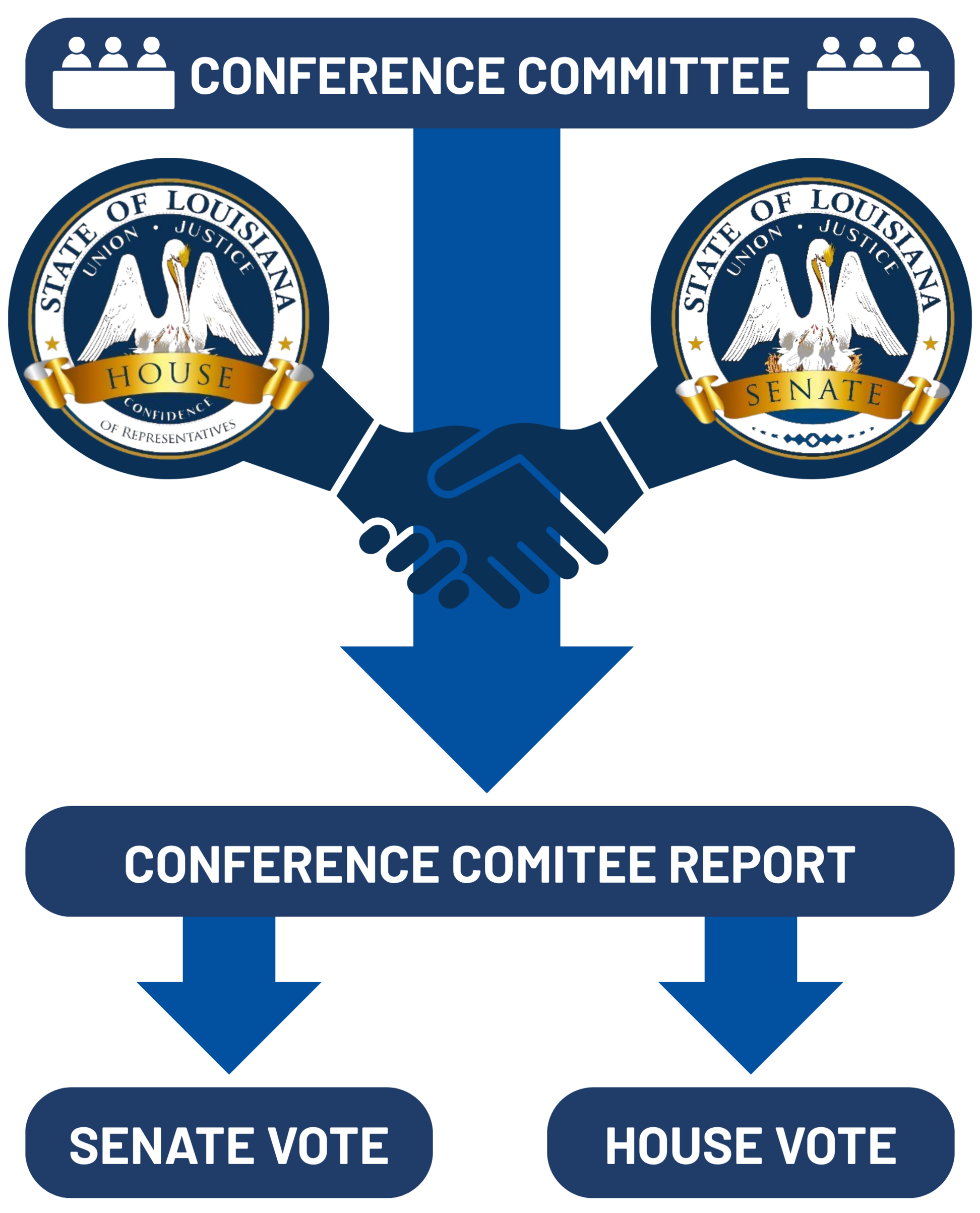Complete Story
06/06/2025
What Louisiana Conference Committees Do and How They Shape Final Legislation
By: Patrick Riley
Director of Government Affairs & Assistant General Counsel
In the Louisiana legislative process, many bills don't reach the governor’s desk without a final round of negotiation, often behind closed doors. This happens in a “conference committee,” which is a temporary group of lawmakers tasked with ironing out the differences between the House and Senate versions of a bill. These committees are a staple of the legislative process, especially during the hectic final days of session, and they often decide the fate of Louisiana’s most important legislation.
 What Is a Conference Committee in Louisiana and How Do We Get There?
What Is a Conference Committee in Louisiana and How Do We Get There?
A conference committee is formed when the Louisiana House and Senate pass different versions of the same bill and can't agree on changes. Keeping our example of a House bill, when an instrument picks up amendments on the Senate side, either in committee or on the floor, those amendments are not automatically integrated into the bill. Instead, the bill returns to the House chamber with proposed amendments from the Senate. The bill’s author may then move to concur or reject the Senate amendments. If the House concurs, the bill heads to the governor. If the chamber that originally passed the bill refuses to accept the other chamber’s amendments, a conference committee is appointed to work out a compromise. Each chamber appoints three members, often including the bill’s author, relevant committee chairs, and trusted negotiators. Most bills never reach this stage, but those that do often involve significant policy differences, extensive rewrites, or major issues like tax reform or the state budget.
How Does the Process Work?
Conference committee negotiations happen mostly in private, without public hearings. On extremely rare occasions, on issues involving a significant public interest, public hearings may be organized. Conferees debate what stays, what goes, and sometimes what new language should be added. Louisiana’s conference committee process allows broad flexibility. Conferees can revise the entire bill, not just the contested parts. This makes conference committees extremely powerful. For example, a frequent tactic of conference committees involves amending language from instruments that may have failed some other step of the legislative process onto the bill in conference. As we have said before, no bill is truly dead until Sine Die.
Once the six conferees reach an agreement, they produce a conference committee report. This is a revised version of the bill with all negotiated changes. The conference committee report must be signed by at least two House appointees and at least two Senate appointees in order to become finalized. This report must then be adopted by both chambers, without amendment. Lawmakers must vote yes or no on the package as a whole.
Rules That Govern Conference Committees in Louisiana
- Each chamber appoints three conferees. House Rule 6.14 requires that the author of the bill and the chairman of the committee that reported the bill be appointed to the committee, leaving the final appointee open to the discretion of the Speaker of the House. Senate Rule 13.21, on the other hand, has no such requirement and leaves the appointees completely to the discretion of the Senate President.
- The committee isn’t limited to resolving specific disagreements. Conferees can revise or completely rewrite the bill.
- While conference committees meet in private, the legislature has rules to promote transparency after the compromise is reached. House Rule 7.11 and related rules require that a digest of the conference report be provided, so members see what’s changed. The final conference report must be distributed and voted on in both chambers.
- According to the rules as written, the conference committee report must be provided at least 24-hours in advance, but that rarely happens in practice. The fast pace of the final week of session generally results in both bodies suspending the rules to consider conference committee reports with only a few hours’ notice.
- For the state budget, additional transparency rules apply. Under Joint Rule 19, the revised budget must be published in an annotated format and lie over for at least 48 hours, unless that requirement is waived.
- Note: In 2024, the Legislature passed Act 406 of the Regular Legislative Session, which enshrined this 48-hour rule in the Louisiana State Constitution for all bills appropriating money.
Timing, Pressure, and Politics
During negotiations, each chamber’s conferees are essentially looking out for the interests of their respective body. They may consult legislative staff for technical advice or drafting assistance. Often, high-profile conference committees (especially on the budget or major bills) will also involve input from legislative leaders not officially on the committee, or even the governor’s representatives. The pressure is usually on to find a compromise quickly, because the Louisiana legislative session clock is ticking.
If the conferees cannot agree, they might produce no report at all, which means the bill fails. In some cases, they might even file a conference report that says, “the conferees were unable to agree,” formally signaling an impasse. This is rare, however. Generally, if no agreement can be reached, the bill dies quietly, having never been reported from the conference committee.
Conference reports often emerge in the final days or hours of session. The pressure to pass something before adjournment is intense. This can lead to fast-moving votes on complex bills. This sort of environment is ripe for mistakes, confusion, and all manner of political gamesmanship. Still, most reports pass. Even lawmakers who don’t love the outcome often vote yes to avoid losing the entire bill. But occasionally, conference reports do get rejected if they stray too far from what members are willing to accept.
 Why Conference Committees Matter in the Legislative Process
Why Conference Committees Matter in the Legislative Process
Conference committees are essential to bridging the gap between the House and Senate, especially on complex or contentious issues. For the public, understanding conference committees helps explain why a bill may change significantly in the final stretch. For insiders, it’s one of the most critical pieces of the legislative puzzle. Conference committees may appear at first glance to be a procedural exercise with limited impact on the legislative process, but that couldn’t be further from the truth. I hope this article has helped you to better understand this rarely discussed aspect of the legislative process.



